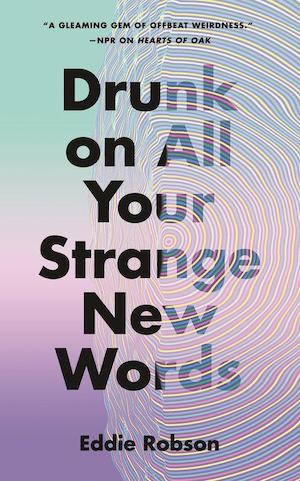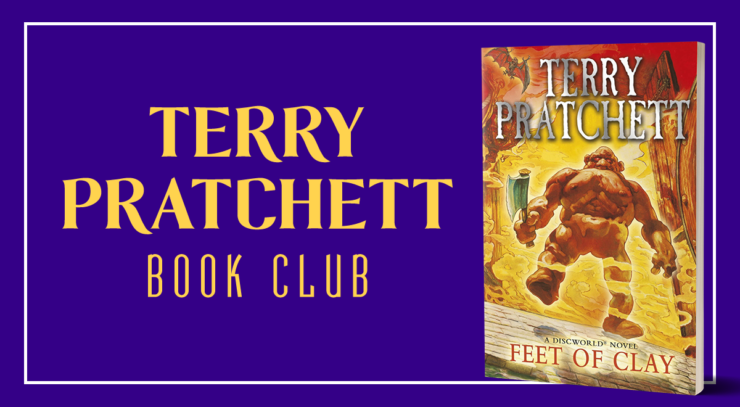We’re back with more intrigue and types of clay than you can… well, I feel like I could shake a stick at that, honestly.
Summary
Nobby heads into the Royal College of Arms. Angua stops by to tell Cheery that she knows the dwarf is a woman, and winds up noticing the clay that Cheery brought back from the crime scene. They go talk to Igneous about clay, but he can’t help them much about the type they found—however, he did have some stolen recently. Angua asks Cheery if she wants to go get a drink, and takes her to Biers, a spot where the “differently alive” hang out. They order fruit juice and try to get information; Cheery mentions that she hates werewolves. Shlitzen the bogeyman starts harassing Angua, so she puts him to sleep with a blanket (existential uncertainty for a bogeyman). Cheery mentions that Shlitzen brought up a baron near where they’re both from in Uberwald, a fellow in charge of a family of werewolves, one of whom ate her second cousin. Constable Visit tells Vimes that they translated the words written in the priest’s blood and they’ve turned out to be commandments of the Cenotine god. Angua and Cheery go to the slaughterhouse district to ask Mr. Sock if they can speak to a golem named Dorfl.
Buy the Book


Drunk on All Your Strange New Words
Cheery gets an up-close look at how golems work—all thanks to the words stored in their heads. Dorfl tells them that he made deliveries to Father Tubelcek, but that he did not kill him because he’s been in the slaughterhouse for the last three days. Cheery thinks he’s lying, but Angua knows there’s no way to prove it. Dorfl tells Mr. Sock that he needs the day off because it’s a holy day. A group of anonymous men meet to discuss keeping Vetinari ill. Vimes checks in on the Patrician and let him know about his extensive Watch guard. He trades his fancy boots for Constable Lucker’s cheap ones, and sets off. Nobby comes in and laments his new lord status, but Colon promises not to tell anyone. Dorfl comes into the Watch House and gives himself up for Father Tubelcek’s murder, but Carrot is certain that he didn’t kill anyone. Vimes is at the Brass Bridge and notices one too many gargoyles, so he sets off after the extra one, and winds up tripping over a wooden corpse thrown in the gutter. Carrot looks at Dorfl’s chem and finds the same words that were put into Father Tubelcek’s mouth, and assumes that Dorfl put them there to try and bring the priest back, since the words are what keep it alive.
Carrot talks to Vimes about Dorfl, stating his case for the golem not being the murderer. He also points to the matchstick Dorfl was carrying and suggests that maybe it knows who the real murderer is. Angua follows Dorfl’s trail and finds a cellar with words written and twelve matchsticks, one broken. She tells Vimes that it seems twelve golems were arguing (the writing on the wall) and they drew lots (the matchsticks) and Dorfl lost. Colon and Nobby are at the Mended Drum discussing whether or not Nobby should sell his title for cash, which leads to Nobby going off about being titled and special now, which leads to Colon buying the bar a round and hearing about people getting pushed out of jobs because of golems. Vimes, Carrot, and Angus are drinking in the Bucket when the same thieves from the bakery try to rob the bar. Angua takes them outside and mauls them a little. Cheery finds arsenic in the substance she found under Father Tubelcek’s fingernails, and goes to tell Vimes, but the whole group isn’t much up to crime solving, so Vimes decides they’ll start back up again tomorrow. Angua walks Cheery home and they talk about being expected to act like men.
The beggars on the street see a golem rush by and try to brain itself with a metal mooring post. Thomas Smith (who changed his name to Stronginthearm so that people would assume his work was dwarfish, chastises his golem Dibbuk for getting back late from his holy day. Dibbuk goes to the anvil, lays his head across it and destroys himself. His slate mentions old men who helped “us” and shame and sorrow. Nobby wakes up in the gutter and Colon reminds him of what they did last night. They hear a roar, but there’s fog on all sides, so they’re not sure where it came from. They run. Vimes dreams of clues all night and gets woken by Constable Visit: The Patrician is somehow worse. Vimes tells them to shut the window on account of the fog and round up everyone who was on duty watching him. He goes over Vetinari’s things and tries to figure what they could be using to poison him this time. Cheery arrive and Vimes notices that she’s wearing earrings that she got from Angua.
Commentary
There’s talk in the earlier Watch books about Carrot being clueless but not stupid, but as these stories go on, we see him develop a canniness that oversteps all of his initial characterization. I’m thinking specifically of how he explains golems to Vimes, and suggests that stories about golems overworking to the point of screwing over their master are intentional slights. Hubris is a common factor in real golem stories, especially ones that are popular in mass media—the Sorcerer’s Apprentice is technically an adaptation of a golem tale. What Carrot is suggesting is that this may be an overworked being’s only way of fighting back against unjust treatment.
This is relevant because what many might refer to as the “core” golem narrative does not enact this specific type of abuse: The Golem of Prague, a 16th century story about a golem brought to life by Rabbi Judah Loew ben Bezalel to protect the Jewish people in Prague from pogroms of the time. In this story, the rabbi removes the golem’s shem before the Sabbath, so that it can rest just as Jewish people rest. There are different versions of the story, including one where the rabbi forgets to remove the shem on Friday, but I think it extremely relevant that we’re seeing a treatment of golems more similar to popular Western narratives that prioritize this idea of overworking to punish the “master” for cruelty.
Of course, people like to overlay metaphors of automation or AI onto the golems of this book, and that’s a legit read of how they’re being used, but the best allegories cover more than one vantage point. I pointed out that you could make a solid argument for Pratchett using dwarves as a stand-in for Jewish people, particularly in the second Discworld novel, but he veers away from that sharply as he continues writing and uses the dwarves for other aspects of prejudice. With the golems, he finds another avenue to observe antisemitism, one that he overlays with more outright references to Jewish culture, which arguably makes for better allegory.
With the dwarves now, what we’re getting is a much sharper commentary on gender and gender roles, paired alongside standard prejudice for their entire species. (The whole bit with Thomas Smith changing his name to Stronginthearm because people think dwarven smithy work is better brings us to cultural appropriation at its most aggressive level.) Pointedly, having prejudice leveled at you doesn’t mean you’re incapable of having your own, and Pratchett doesn’t shy away from that; Cheery’s hatred for werewolves is a prime example. And yeah, it’s true that she lost a cousin to a werewolf, but this is the same as saying “I once got mugged/assaulted/injured by [person who happens to be from marginalized group] and now I’m wary of/hostile towards/outright bigoted to [all said marginalized group].” And people do use that excuse in real life, frequently.
What we see happening with Cheery and Angua is the building blocks of recognizing the limitations of gender and gender expression in various environments. Both of these women know what it’s like to be expected to behave like “one of the boys” and have tried their hardest to do so despite the fact that they don’t enjoy it very much. The only difference is that for Angua it’s her work culture inflicting this on her, whereas for Cheery it’s her home culture.
Of course, it’s easy to overlay a trans narrative onto Cheery. She may be a cis woman (but also maybe she isn’t; Pratchett tends to be wonderfully vague on the subject of physical parts), but she is struggling against dysphoria and an inability to see herself the way others perceive her. Moreover, I’m not entirely sure because I’m not hunting through everything I just read to be certain, but I’ve got it correct, Pratchett makes a pointed shift in the narrative with regard to her—at the start of the book Cheery gets ‘he’ pronouns, but once Angua makes the reader aware of Cheery’s actual gender, Pratchett refrains from pronouning her at all.
That right there feels sharply aligned with transgender experience; while plenty of trans people simply know their true gender, there are many trans folks who don’t and need time to occupy a gender to see if it feels right for them. The choice to avoid Cheery’s pronouns can be read as a narrative wink toward the other characters not knowing she’s a woman, but it can also be read as allowing her that space for discovery. She’s finding her way towards a presentation and inhabitance that works for her, as a woman who’s never had the chance to feel like a woman.
Hence, those earrings.
Asides and little thoughts:
- Apart from the fact that Biers being a place “where everybody knows your shape” is meant to be a Cheers reference, I keep thinking how this is actually more accurate to the bar-going experience? I don’t know most people in bars I frequent by their names, I just… know them.
- Just the constant slagging off of Sherlock Holmes is great, and I say that as a person who likes Sherlock Holmes. Vimes is right—so many observations could be flat out wrong and most of his guesses are luck.
- I’m annoyed by the fact that the US version of the book doesn’t show the golem speech in the Hebrew-style font. Gimme.
Pratchettisms:
A moment of time rang like a glass bowl, and then there was a sense of relaxation.
“Spare the thunderbolts and spoil the congregation, eh?” said Vimes.
They were men who felt that The Time Had Come. Regimes can survive barbarian hordes, crazed terrorists, and hooded secret societies, but they’re in real trouble when prosperous and anonymous men sit around a big table and think thoughts like that.
As Vetinari has pointed out in that way of his, the more policemen you had, the more crimes seemed to be committed.
“We’re all lying in the gutter, Fred. But some of us’re lookin’ at the stars…” (Writer’s note: points for the Oscar Wilde reference)
The real world was far too real to leave neat little hints. It was full of too many things.
Next week we’ll read to:
“Probably hanging around somewhere, staying out of trouble,” said Vimes.










